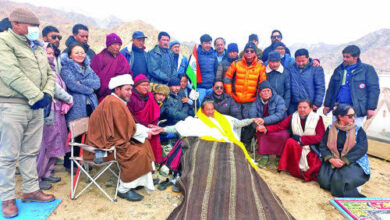Plant-Based Diet for a Healthy Man and Earth

Recent studies across the world have clearly indicated that the long-term consumption of dead food obtained from dead animals comes with an increased risk of total mortality and deadly diseases. It is, therefore, highly recommended that we should switch over to the alive food offered by mother nature.
Plant-based diet –VanaspatayaAhar, also vegetarian food is, in fact, a diet consisting entirely of foods derived from plants, including vegetables, seeds, pulses, nuts, legumes, grains and fruits. The history of this Ahar–food goes to the remote past, thousands of years back. The Sanatana Dharma concept related to this, divulges that it is, along with the moral upliftment of man, the best for healthy body and longevity. Besides this, aspects of environmental equilibrium, which essentially include nature conservation and animal protection, are also connected with it.
Evidences obtained from excavating works at the various site of the Indus Valley Civilization (the most active period of which remained 3300-1700 BCE or even earlier) disclose that the plant-based diet was not only popular in farming and animal keeping –Pashupalak Indians, but it was also the predominant part of their disciplined and planned life.
Plant-based diet has been discussed in many of the leading Indian scriptures –Dharmagranths, directly or indirectly; as we know it well, it has been declared to be the best from the viewpoint of man’s prolonged active and healthy physique and a peaceful state of mind; more especially as a Mantra for one’s healthy thinking process with the purpose of his indulgence in the large scaled welfare of humanity.
Plant-based diet –vegetable food (the term vegetable derived from the Latin word Vegitus means lively) is fairly symbolic of goodness –virtuousness (Sattvikta), and it is indeed age-enhancer, invigorating, strong body-builder and joyful. YogeshwaraShrikrishna says in the Shrimadbhagavad-Gita (17:8), “आयु: सत्त्वबलारोग्यसुखप्रीतिविवर्धना:/रस्या: स्निग्धा: स्थिराहृद्याआहारा: सात्त्विकप्रिया:”,i.e.,“Persons in the mode of goodness prefer foods that promote the life span, and increase virtue, strength, health, happiness, and satisfaction. Such foods are juicy, succulent, nourishing, and naturally tasteful.”
The above-mentioned truth-based Shloka of the Gita remained the guiding-force for Sushruta(Sixth Century BCE), the father of surgery who keeping the Sattvikta as the nucleus even in surgery work taught his disciples to use fruits, vegetables along with wax-figures in experiments in place of animals and dead bodies as is done currently. His work, Sushruta Samhita, one of the most important surviving ancient treatises on medicine and also a foundational text of the Ayurveda–addressing all aspects of general medicine, which is, in fact, a part of the Atharvaveda a number of Mantras of which are dedicated to environmental equilibrium and nature conservation, discloses all-timely significance of plant-based diet for individual as well as for the society and humanity.
This is a long chain in which along with ancient Maharshis–inventors of medieval-contemporary periods are included who called on fellow-being to adopt plant-based diet in life in place of non-vegetarian food. Not only this, many subject-specialists of the modern era from India and abroad including America and Europe, through their clinical studies-research focused on the types of plant-based foods –fruits, vegetables, grains, legumes and nuts conclude with tremendous improvement of diabetes biomarkers, such as reduced incidence of obesity. Plant-based diets, according to their findings, improve emotional and physical well-being, accord relief in depression and general health; cognitive and mental effects of a plant-based diet are also positive. That is why; after their intensive research, they urged people to prefer plant-based diet (or vegetarian food) –depend upon botanical kingdom for the reasons:
1-In non-vegetarian food there is repetency of uric acid; it, therefore, increases cholesterol and blood-pressure leading to heart disease;
2-Non-vegetarian food increases diabetes; this imbalance blood-sugar level and effects one’s insulin;
3-Non-vegeterian food weakens one’s digestive system as human stomach is not designed to digest the food meant for carnivores; and
4-Non-vegetarian food (as many of the subject-specialists, physicians and dietitians are of the firm opinion) increases vindictive trends in man, over eating of this even leads to unease in him and habit of eating every kind of animal, bird and insect creates negativity leading to inhuman thinking and activities, one such of the recent examples of the outbreak of the pandemic of novel Covid-19, which spread from the wet-markets in Wuhan city (The People’s Republic of China), known for a large food market selling non-edible wild animals, live fowls etc.
Contrary to it, plant-based diet –vegetarian food protects the cells of a healthy body; this diet –rich in fibre (in fact, fibre is predominantly available only in plants and food stuff prepared thereof), minerals, vitamins and low in saturated fats, repairs damaged cells rapidly and naturally. Due to being low in saturated fats, this diet keeps blood pressure and cholesterol in control; consuming such a diet for a long time lowers one’s risk of cardiovascular diseases, more especially plant-based diet, low in sodium and fats and rich in fibre and potassium, helps lower the risk of CVDs. It also helps raising man’s level of morality high, strengthens constructive approach in him with the spirit of responsibilities.
II
Currently, the world is facing a serious challenge from the Coronavirus. Almost all the counties of the world are affected by this deadly disease even life of lakhs of people (may be crores in number in near future) around the world is at a very high risk today.
This serious problem, as already mentioned while discussing in brief about the wet-markets of Wuhan city of China, seems relating to years’ old food habit of the people –large-scaled consumption of meat of non-edible wild animals, birds, insects etc. This eating habit along with badly affecting human health through various lethal diseases from time-to-time has caused a great concern for environmental equilibrium and nature conservation, both the vital conditions for existence.
The current problem is a lesson for humanity. It calls for a fundamental change in eating habit of man and it must not be taken lightly. For, it would be desirable on priority that man abstains from the habit of eating dead food prepared from the dead flesh of wild animals, birds, insects etc., as soon as possible.
As one’s eating habit cannot be changed immediately, or by force, therefore, concrete decisions and making of policies and their implementations by governments are needed in this regard taking it as their sole responsibility to save the whole lot of humanity. In such decisions, killing and eating of wild animals and non-edible birds, insects etc. must be banned completely. Further, mass awakening towards flaws of non-vegetarian diet and its bad effects on human body and nature, and benefits and positive impact of vegetarian food on life is necessary.
It is the high time to inspire people to bring the habit of eating non-vegetarian food to the minimum and giving preference to vegetarian –plant-based diet over non-vegetarian food for their own good health and disease-free long-life viewpoint, also for environmental equilibrium and concern for mother nature. In this regard, the role of educational institutions is, without a doubt, the most important as they significantly contribute in developing societies –educating at the early stages of life. Under clear government’s policies and with provision of special budgets for the purpose, this task could be carried forward through educational institutions; knowledge of this can be imparted making it a part of prescribed syllabi throughout the world.
Once again, India is emerging as the Vishwaguru. The manner in which Hindustan has come forward to support the whole world in these days of great calamity that is unprecedented and the nations of the world are seeing towards India with high hopes. In such a state, India should take a lead to generate awareness among people within and outside the nation for vegetarianism –plant-based diet purely with the purpose of large-scaled welfare of one and all on this planet.
In the special package recently announced by the Finance Minister of India, a provision of Rs. 4000 crores for the promotion of herbal farming is welcome. However, for the awareness of vegetarianism –pant-based diet, concrete and planned work is expected. Good health is the basis of life-protection and development. It is like a Sanjeevani for human health. For this, if India, through her work for large-scaled awakening among the people around the world, thus, ascertaining their wellbeing, succeeds, it will also be an important step towards her emerging as a Vishwaguru.





